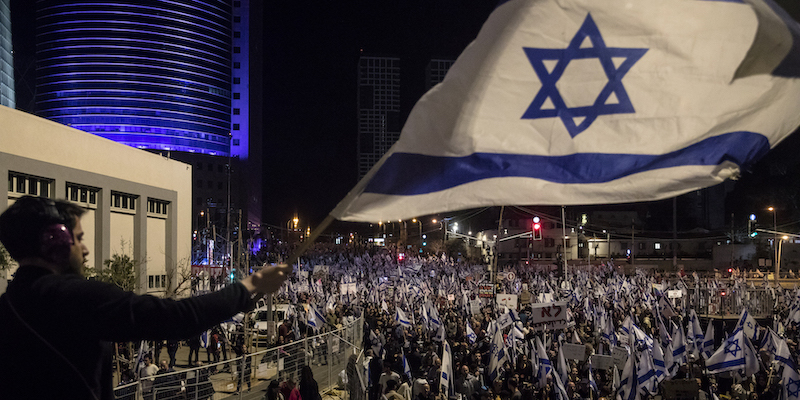Saturday hundreds of thousands of people have manifested in Israel against the government of Benjamin Netanyahu and his plan to reform the judicial system. The demonstrations, organized in some of the main cities of the country, were among the most well-attended in recent months, unprecedented in Israel’s recent history.
According to the organizers, at least 500,000 people took part in the demonstrations and Haaretzhistoric Israeli newspaper, has them definite “the largest in the history of the country”. In Tel Aviv alone, there were at least 200,000 participants, many carrying Israeli banners and flags. In Haifa, in the north of the country, around 50,000 demonstrators marched through the streets of the city.
The protests organized by opposition parties and various associations have been going on for ten weeks now, with requests for the government to renounce the reform of the judicial system and other measures which, according to the protesters, risk weakening, if not even compromising, Israeli democracy. The protest is transversal and includes many sectors, from high technology in strong development in the country to healthcare, to express dissent against the government formed in the last days of 2022 with the most right-wing coalition in the history of Israel.
The most contested law concerns the Supreme Court, which plays an exceptionally important role in the political life of the country. The reform, promoted by the Netanyahu government a few days after taking office, provides that parliament with a simple majority vote can cancel the Supreme Court’s sentences on any administrative measures deemed unreasonable, shifting final control to the government’s political forces. The new law also provides for a change in the method of appointing the Court, effectively entrusting it to the political power. The government justifies the reform with the desire to reduce the excessive power of unelected judges, but according to many critics the new arrangement would leave almost absolute powers to the government coalition and its prime minister, so much so as to question the very definition of Israel as a full democracy.

Tel Aviv, Israele (Amir Levy/Getty Images)
Former Prime Minister Yair Lapid, of the main opposition Yesh Atid party, held a speech in Be’er Sheva, in the south of the country, saying that Israel is facing an unprecedented crisis: «A wave of terrorism is hitting us, our economy is in ruins, money is leaving the country. Iran has just struck a new deal with Saudi Arabia. But the only thing this government is interested in is destroying Israeli democracy.”

Tel Aviv, Israele (Amir Levy/Getty Images)
Netanyahu has been arguing for weeks that the reform of the Supreme Court is necessary to balance power relations between state institutions, rejecting the allegations of the demonstrations. The government has so far maintained its firm line, despite numerous calls from experts and analysts to review the reform. It is not yet clear when the disputed reforms will be discussed and voted on in the plenary, but times could be short: if no second thoughts or compromises are made, they could pass within the next ten to fifteen days.
